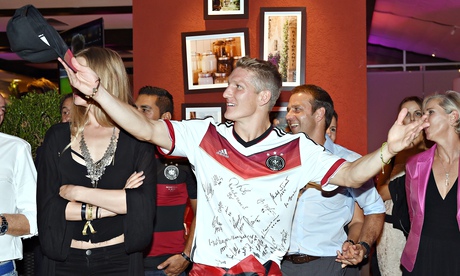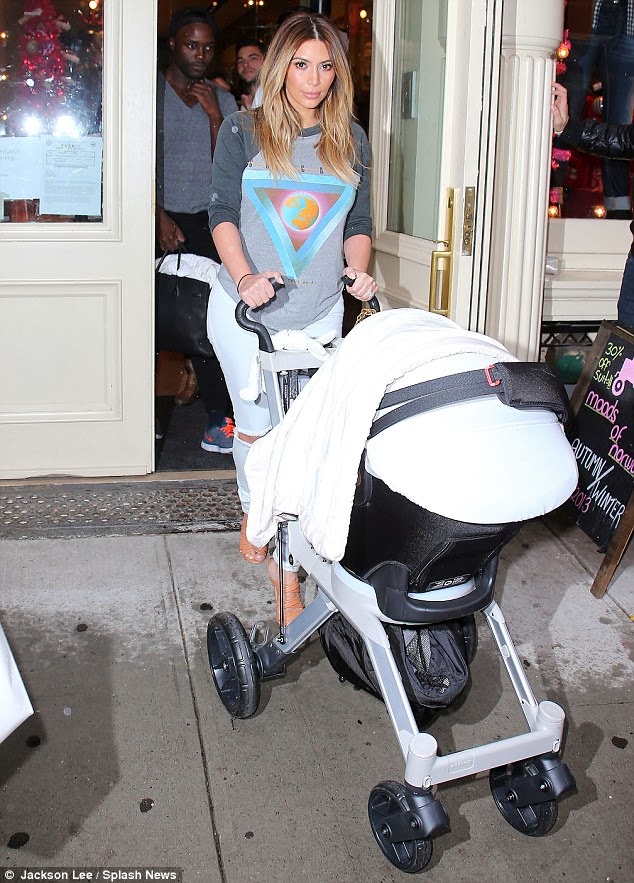Germany’s Bastian Schweinsteiger: ‘We have the hunger to do it again’

Minutes after lifting Germany’s first World Cup for 24 years in the
Maracanã the triumphant generation of players who have grown up together
said they had the hunger to dominate for years to come.
Emerging from a beer-soaked dressing-room audience with Angela Merkel, a battered Bastian Schweinsteiger said they did not intend to stop with Germany’s first trophy since Euro 96.
“You never know what happens in the future. But we are fit, we are hungry and we have some good players who are 25 years and around that age,” he said.
“It will give us hunger, absolutely. We want to do it again at the next tournament. The important thing is that the young guys have the experience of this tournament.”
This was not the German arrogance of popular cliché but simply a recognition that the country’s football production line had turned out, by design, a bumper crop of talent. In particular 1988 was a vintage year.
“We have very good young players in Germany. Most of the team is about 25,” said the defender Mats Hummels of a side that put 11 goals past Portugal and Brazil and also overcame France and Argentina.
“I think we have six or seven of us who were born in 1988, so there’s a big chance to stay successful in these next years – but of course it’s only a chance.”
As his players were filing out of the dressing room sporting their medals, flags and specially produced “Champions” T-shirts, chanting as they went, Joachim Löw was explaining how their 1-0 extra-time triumph had been 10 years in the making.
That is how long Löw has been involved in the German set-up. In fact, the victory can be traced back further, to the fundamental reorganisation of the German game in the wake of humiliation at Euro 2000.
Wolfgang Niersbach, the DFB president, underlined the importance of Germany being European champions at under-21 level five years ago. “You must take note of the fact that six of our players won the Under-21 European Championship in 2009 and they are now part of a World Cup-winning team,” he said.
Hummels said that the nucleus of that 2009 side was special. “If you see the names, there are something like 10 players in the World Cup who played in that tournament. Six or seven of them are from Germany, the rest from other countries,” he said.
Schweinsteiger epitomised Germany’s combination of skill and stamina. He said the team played without pressure but acknowledged there was relief at having cleared the final hurdle after so many near misses. “Every title is important. I’m happy that we won this title with the guys,” he said.
“Since the tournament was held in Germany in 2006, we always go as far as the semi-final, finish in third place or reach the final in 2008 but lose. But now we have taken one step more and that is the most important thing for the whole of this squad.”
The “hurt but happy” midfielder, who was sporting a cut under his eye and had to have stitches during the battle with Argentina, said the experience would stand Germany in good stead at the European Championship in France in 2016.
“We will go to France and try and do it again, for sure. We have the experience now from what we have done here and that will help us. I think what happened before in South Africa at the last World Cup helped too.”
He acknowledged that Germany had forged a new style of play over recent years but said their traditional strength and resilience also remained key.
“We have quality players but the most important thing is that we have the tradition in our game,” he said. “We can run, we can make pressure, we can defend and the mix between this is the solution.”
Hummels unsurprisingly pinpointed Mario Götze’s smart extra-time finish as the “defining moment” of their World Cup: “We knew we needed luck, so this goal was for all of us. It was a moment we will always remember.”
There was a calm confidence about Germany in Brazil, allied to a keen attention to detail, that Schweinsteiger put down to their mix of youth and experience.
“It’s not so easy because we have a young team. But we have some players like Philipp Lahm, Mesut Özil and Per Mertesacker who have the experience. This mix makes a big difference.”
After they put seven goals past the hosts, there was a groundswell of support for the Germans in their Flamengo-style away kits as 200m Brazilians willed them to stop Argentina.
“We are the first team from Europe to win the World Cup in South America, so of course it is very special. The Brazilian people treated us so well, so this was for them too,” said Schweinsteiger. “We wanted to say thank you. They are happy people and now so are we.”
A beaming Niersbach said the team would celebrate Germany’s first World Cup since reunification with their fans at the Brandenburg Gate in Berlin on Tuesday and left with words of warning for their rivals. “We put a system together and other young players will come through behind them in the coming years.”
Emerging from a beer-soaked dressing-room audience with Angela Merkel, a battered Bastian Schweinsteiger said they did not intend to stop with Germany’s first trophy since Euro 96.
“You never know what happens in the future. But we are fit, we are hungry and we have some good players who are 25 years and around that age,” he said.
“It will give us hunger, absolutely. We want to do it again at the next tournament. The important thing is that the young guys have the experience of this tournament.”
This was not the German arrogance of popular cliché but simply a recognition that the country’s football production line had turned out, by design, a bumper crop of talent. In particular 1988 was a vintage year.
“We have very good young players in Germany. Most of the team is about 25,” said the defender Mats Hummels of a side that put 11 goals past Portugal and Brazil and also overcame France and Argentina.
“I think we have six or seven of us who were born in 1988, so there’s a big chance to stay successful in these next years – but of course it’s only a chance.”
As his players were filing out of the dressing room sporting their medals, flags and specially produced “Champions” T-shirts, chanting as they went, Joachim Löw was explaining how their 1-0 extra-time triumph had been 10 years in the making.
That is how long Löw has been involved in the German set-up. In fact, the victory can be traced back further, to the fundamental reorganisation of the German game in the wake of humiliation at Euro 2000.
Wolfgang Niersbach, the DFB president, underlined the importance of Germany being European champions at under-21 level five years ago. “You must take note of the fact that six of our players won the Under-21 European Championship in 2009 and they are now part of a World Cup-winning team,” he said.
Hummels said that the nucleus of that 2009 side was special. “If you see the names, there are something like 10 players in the World Cup who played in that tournament. Six or seven of them are from Germany, the rest from other countries,” he said.
Schweinsteiger epitomised Germany’s combination of skill and stamina. He said the team played without pressure but acknowledged there was relief at having cleared the final hurdle after so many near misses. “Every title is important. I’m happy that we won this title with the guys,” he said.
“Since the tournament was held in Germany in 2006, we always go as far as the semi-final, finish in third place or reach the final in 2008 but lose. But now we have taken one step more and that is the most important thing for the whole of this squad.”
The “hurt but happy” midfielder, who was sporting a cut under his eye and had to have stitches during the battle with Argentina, said the experience would stand Germany in good stead at the European Championship in France in 2016.
“We will go to France and try and do it again, for sure. We have the experience now from what we have done here and that will help us. I think what happened before in South Africa at the last World Cup helped too.”
He acknowledged that Germany had forged a new style of play over recent years but said their traditional strength and resilience also remained key.
“We have quality players but the most important thing is that we have the tradition in our game,” he said. “We can run, we can make pressure, we can defend and the mix between this is the solution.”
Hummels unsurprisingly pinpointed Mario Götze’s smart extra-time finish as the “defining moment” of their World Cup: “We knew we needed luck, so this goal was for all of us. It was a moment we will always remember.”
There was a calm confidence about Germany in Brazil, allied to a keen attention to detail, that Schweinsteiger put down to their mix of youth and experience.
“It’s not so easy because we have a young team. But we have some players like Philipp Lahm, Mesut Özil and Per Mertesacker who have the experience. This mix makes a big difference.”
After they put seven goals past the hosts, there was a groundswell of support for the Germans in their Flamengo-style away kits as 200m Brazilians willed them to stop Argentina.
“We are the first team from Europe to win the World Cup in South America, so of course it is very special. The Brazilian people treated us so well, so this was for them too,” said Schweinsteiger. “We wanted to say thank you. They are happy people and now so are we.”
A beaming Niersbach said the team would celebrate Germany’s first World Cup since reunification with their fans at the Brandenburg Gate in Berlin on Tuesday and left with words of warning for their rivals. “We put a system together and other young players will come through behind them in the coming years.”


Comments
Post a Comment